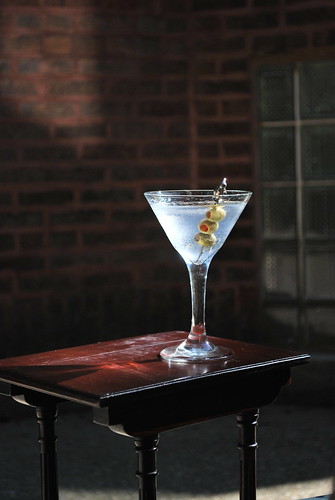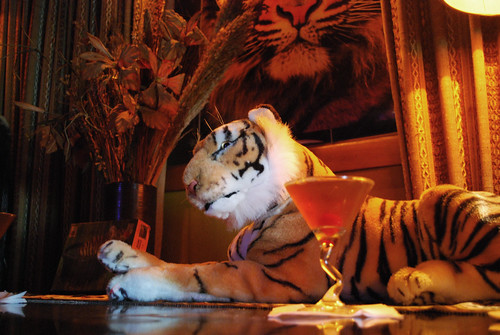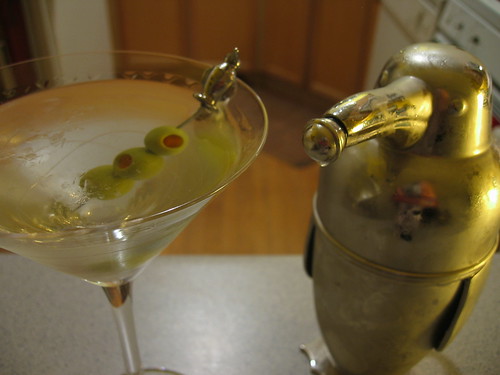
{Photo by rocketlass.}
One of my many sure-to-be-unfulfilled ambitions is to edit an anthology of literature's great hangover scenes. The centerpiece would of course be Lucky Jim, whose recent republication by NYRB Classics is plenty of reason to quote it again:
Dixon was alive again. Consciousness was upon him before he could get out of the way; not for him the slow, gracious wandering from the halls of sleep, but a summary, forcible ejection. He lay sprawled, too wicked to move, spewed up like a broken spider-crab on the tarry shingle of morning. The light did him harm, but not as much as looking at things did; he resolved, having done it once, never to move his eyeballs again. A dusty thudding in his head made the scene before him beat like a pulse. His mouth had been used as a latrine by some small creature of the night, and then as its mausoleum. During the night, too, he'd somehow been on a cross-country run and then been expertly beaten up by secret police. He felt bad.Good god, that "tarry shingle of morning," the "dusty thudding," the cross-country run. The whole passage trips off the tongue--or would, that is, were the tongue not coated on waking in what seems to be the matted pubic hair of a syphilitic muppet.
Amis also addressed the subject in his book Everyday Drinking:
When that ineffable compound of depression, sadness (these two are not the same), anxiety, self-hatred, sense of failure and fear for the future begins to steal over you, start telling yourself that what you have is a hangover. You are not sickening for anything, you have not suffered a minor brain lesion, you are not all that bad at your job, your family and friends are not leagued in a conspiracy of barely maintained silence about what a shit you are, you have not come at last to see life as it really is, and there is no use crying over spilt milk.Amis, as you probably know, was something of an expert at both the putting in and the sweating out of the stuff. Cyril Connolly is another who was no stranger to the bottle, and in his sole novel, The Rock Pool, he dealt expertly with its consequences:
Naylor woke late, with a hang-over. It was relatively a new sensation for him, for he was proud of a certain donnish temperance. He would take two whiskies at night and suddenly round on those of his friends who had a third one. Not that he minded, only it seemed rather childish; remember the law of diminishing returns? And why make yourself sick the next day? But strangely enough he was not sick--instead he seemed to be spun up in a kind of voluptuous cocoon. The sun streamed in over the purple bougainvillea. He tottered down to the sea. Lying on his back, the curious sensation was stronger, his stomach seemed made of wool, his throat felt some rich sensual craving, his mind floated among a multitude of sensations, all his senses were slowed up to an unusual delicacy. He masticated a line of Eliot: "The notion of some infinitely tender, infinitely suffering thing." Opening his eyes, the sky and sand were grey as a photograph, his antennae played over the tiny crystals, women's brown legs passed him on the board-walk, but he could not look up. "You see in me a creature in the most refined state of intoxication," he thought, and waves of sensual and lotophagous reminiscence swept over him.Much as I love the martini, I'll cop to a certain "donnish temperance" myself--one tends to suffice--and I doubt I'm alone in this, our (thank god) more liver-conscious age. In these more temperate times, perhaps it's too much to hope for new entrants to the tippler's TOC?
Fortunately, British novelist Will Wiles has come to the rescue: one of the many great pleasures of his smart, funny, even scabrous new novel Care of Wooden Floors is its splendid rendering of a hangover.
But we'd be doing the memory of Lord Rochester a disservice if we skipped straight to the consequences and neglected the earning of the hangover! First let's get the protagonist--a mostly directionless young Brit who is house-sitting for a particularly particular friend in an eastern European city--drunk. With a friend of said friend who is a musician and (thus?) a committed drinker. Ah, yes, here it comes:
My brain felt thick with scabs, old and new. It was full of wine, it rotated, looked close to spilling.And that's before they even get to the strip club:
The tide of alcohol was coming back in, dissolving these arguments, mushing them into short-circuiting feedback loops, eating away at ethics, at second thoughts, at broader contexts, at tomorrows and consequences. Amber bumped and ground, and the drink revealed a simple formula on the smeared palimpsest of my mind: seek pleasure. . . . The beer was not helping me as I thought it had been--it had been lying to me. I thought of fermentation, of yeast, of gases, of microbial processes. The wine churned, and came close to spilling.If only he'd been drinking in Springfield, Homer could have told him that the beer was lying.
And it does spill. Oh, does it spill. But he at least makes it back home, somehow, only to be greeted by the morning:
White noise. Indistinct sound, beneath hearing, the growl and whoosh of blood forcing through tight passages. A two-part beat, the slave-driver's padded drumsticks rising and falling as an exhausted muscle trereme heaves across a treacle ocean. A heart, pumping hot, thick goo in place of blood. Cells striving and dying. The electricity of the brain whining like an insectocutor. A cascade of neural sparks, an ascending, crackling chain reaction, synapses firing. Sensation--the sensation of no sensation. Then, awareness.Or, as Withnail once put it, "I feel like a pig shat in my head." The growing awareness of the extent of his pain continues for three more extravagant pages. "Committees of investigation" are formed to determine that, yes, he is merely hungover. But oh, that merely:
A cosmos of pain, discomfort, sickness, and weakness. I was awake. At first, everything seemed to be pain, but this was an illusion brought on by apparent damage to the sensory apparatus. The brain. The brain hurt. It was a sinkhole of pain, dragging all other senses in. Each beat of the drum, each stroke of the oars, simply scooped more sensation towards that pulsing black point of hurt. My heart was going to give up and get sucked into my head, it would explode, and I would die in bed.
In bed. So I was in bed. I realised that this was a good sign.
My body was made from wads of soggy material inexpertly lashed together with stringy sinews. The wads composed of the worst stuff possible--bad milk, wine turned to vinegar, chewed gum, earwax, the black crud that accrues on the bottom of computer mice.The whole scene is the work of a writer having fun with words, and it definitely earns Wiles a place in my chimerical anthology.
And with that, I'll pour the night's lone martini and settle in at the piano to play some Johnny Mercer. Now there was a man who could put it away.

